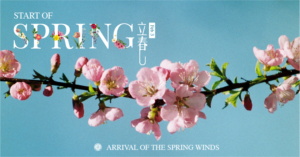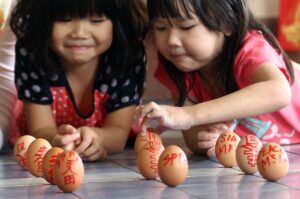

Its like magic!: Six-year-olds Issabelle Chung (left) and Renee Sim, both pupils of Padungan Kindergarten in Kuching, balancing several eggs in an upright position. The Chinese believe that egg balancing is connected with Lichun, the solar term beginning Chinese spring calander on February 4 or 5 when the sun is at the celestial longitude of 315°. On this day, fresh chicken eggs can be balanced on their broad end between noon and 1pm due to the earth’s gravity alignment.
Lichun, also known as the “Beginning of Spring,” is an important solar term in the traditional Chinese calendar. It marks the official beginning of the spring season in East Asia and is considered a significant event in the Chinese New Year festivities.
Lichun usually falls on or around February 4th in the Gregorian calendar, although the exact date may vary slightly from year to year. It signifies the end of the winter season and the arrival of warmer weather and longer days. The term “Lichun” translates to “the establishment of spring” in Chinese, reflecting the transition from the cold winter to the revitalizing season of spring.
In Chinese culture, Lichun is associated with various customs and traditions, particularly in relation to the celebration of the Chinese New Year. It is believed that activities carried out during this time can bring good fortune and blessings for the upcoming year. Some of the common practices include:
- Welcoming Spring: People engage in outdoor activities to enjoy the pleasant weather and celebrate the arrival of spring. It is common to see parks and gardens filled with families flying kites, having picnics, or participating in traditional games.
- Praying for Prosperity: Many people visit temples or ancestral graves to offer prayers and seek blessings for a prosperous year ahead. This practice is believed to bring good luck and ensure the well-being of family members.
- Eating Special Foods: Certain foods are traditionally consumed during Lichun to symbolize good luck and abundance. For example, tangyuan (sweet glutinous rice balls) are often eaten as they represent reunion and togetherness.
- Farming Activities: Lichun also marks the beginning of the agricultural season, and farmers may begin preparing their fields for planting crops. This time is seen as an auspicious period for farming, with the hope for a bountiful harvest.
- Traditional Festivities: Lichun is a festive time, and various cultural events and performances take place across China and other East Asian countries. Lion and dragon dances, lantern festivals, and parades are common during this period.
Overall, Lichun holds great significance in Chinese culture as it ushers in the arrival of spring, symbolizing new beginnings, growth, and prosperity. It sets the stage for the festive atmosphere of the Chinese New Year celebrations that follow, marking a time of renewal and hope for the year ahead.





